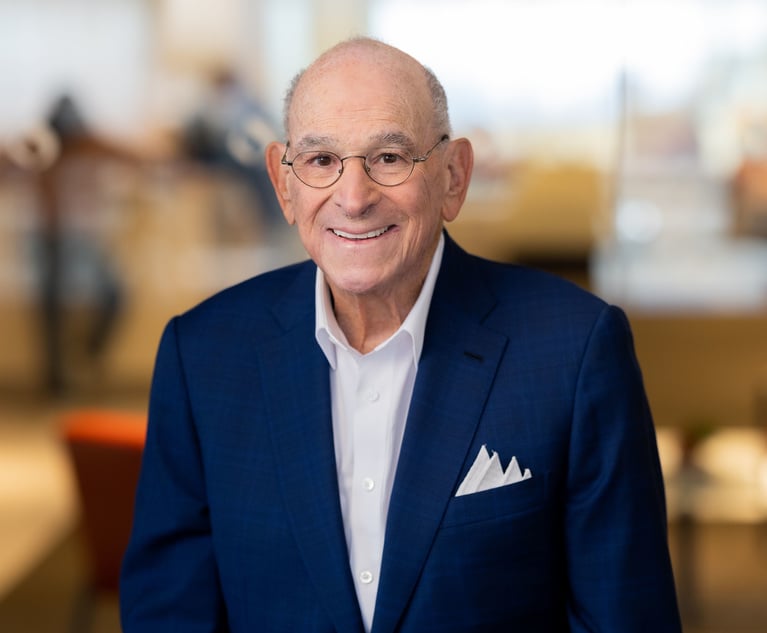Will Your Case Go to Trial? This Computer Program Might Know the Answer
It's stylish to bemoan how few cases go to trial these days—and for first chair litigators (and the reporters who write about them) it's a bit…
September 20, 2017 at 11:05 AM
6 minute read
The original version of this story was published on Law.com
It's stylish to bemoan how few cases go to trial these days—and for first chair litigators (and the reporters who write about them) it's a bit anticlimactic when litigation gets resolved behind closed doors.
But to SettlementAnalytics, trials are basically a failure. Going to court means the “economic forces that ordinarily encourage a negotiated solution” broke down.
If a trial is indeed likely, the Hong Kong based company figures it's better to be forewarned as early as possible, so as to adopt “proactive and calibrated trial-avoidance measures.”
The company on Tuesday announced a new legal metric and advisory service that it bills as “the world's first quantitative legal measurement to indicate the likelihood of a lawsuit proceeding all the way to trial and adjudication.”
Some top Big Law litigators are skeptical.
“I say to new clients that any lawyer who guarantees you'll win a case is someone you shouldn't hire because there are no guarantees in litigation,” said Randy Mastro, who co-chairs Gibson, Dunn & Crutcher's litigation practice. “And the same logic applies to predicting settlement. Litigations evolve over time and take on a life of their own. That's what dictates whether a case will settle, not some mathematical formula.”
 Kirkland & Ellis star litigator James Hurst has questions as well. “I am somewhat skeptical about the value of a computer-generated prediction about the likelihood of a trial,” he said. “Some factors are probably easy to quantify, like the type of case or the presiding judge. But others are not, such as the intuitive factors that drive my own often-correct predictions, like whether the case is close on the merits, my assessment of opposing counsel's willingness to try a close case, and my own client's historical courage in taking cases to a jury.”
Kirkland & Ellis star litigator James Hurst has questions as well. “I am somewhat skeptical about the value of a computer-generated prediction about the likelihood of a trial,” he said. “Some factors are probably easy to quantify, like the type of case or the presiding judge. But others are not, such as the intuitive factors that drive my own often-correct predictions, like whether the case is close on the merits, my assessment of opposing counsel's willingness to try a close case, and my own client's historical courage in taking cases to a jury.”
So how is the “Litigation Settlement Failure Index” supposed to work?
There is “an economic signature to the subset of disputes which can be expected to end up in a courtroom,” Robert Parnell, president and CEO of SettlementAnalytics, said in a news release. “By analyzing the economic structure of legal conflicts we can extract the implied probability of settlement failure.”
The company points to the theory of divergent expectations, which suggests that some cases don't settle because of “excessive mutual optimism” about the outcome on both sides.
To me, for example, that sounds like the Silicon Valley gender discrimination lawsuit between Ellen Pao and venture capital firm Kleiner Perkins Caufield & Byers. I could see how both sides went into that trial thinking they had a good chance of winning, and indeed, perhaps another jury might have reached a different result.
But I don't think Kleiner Perkins' lawyer, Lynne Hermle of Orrick, Herrington & Sutcliffe (who won the trial)—or Pao's lawyers, Alan Exelrod of Rudy, Exelrod, Zieff & Lowe and Therese Lawless of Lawless & Lawless, needed a computer program to tell them that.
There's also the theory of asymmetric information, which “suggests that cases fail to settle because of a high level of uncertainty in settlement decision making.” That sounds like a nice way of saying the lawyers on one side didn't know what they were doing.
SettlementAnalytics says it combines both these theories, and also factors in things like capital costs, time to trial, cost rules, risk aversion, hybrid and split contingent fee structures to “make a categorical prediction of trial-or-settlement.”
What seems to be missing though is what you might call the Mark Cuban factor. The billionaire basketball team owner/ reality television star readily admits he could have settled U.S. Securities and Exchange Commission insider trading charges against him for far less than he spent in legal fees. That would have been the economically rational move—but he didn't care.
“I said 'Screw you, SEC. I don't care who you are. You're not going to push me around,'” he told (then) Tonight Show host Jay Leno after he won his 2013 trial.
It's not just Mark Cuban. Other clients are also willing to fight (albeit more quietly) for what they believe in.
“Analytics cannot fully account for intangible factors that sometimes play into a client's decision whether to try a case,” said Hogan Lovells global class action group head Craig Hoover. “Although class action trials are rare, we tried and won a class action case recently when our client believed strongly as a matter of principle that the company had done nothing wrong and was willing to take the case all the way through trial in order to establish that fact.”
Decisions about whether to settle or go to trial can be based on other non-quantifiable factors too.
“For example, you often need to know the business dynamic between the parties, and the mindset and motivation of the lawyer on the other side,” said Michael Sacksteder, who chairs the patent litigation group at Fenwick & West. “Sometimes, lawyers try to assess their chances based on something as subjective as the body language or tone of voice of the judge, and then they advise their clients based on those intangible, but sometimes crucial, intuitions.”
Other times, there is very little mystery involved.
“For a subset of cases, it's clear from the get-go that they will settle,” said Baker Botts partner Jonathan Shapiro, who chairs the firm's litigation practice in San Francisco and Palo Alto. “Some are transparently filed to achieve an immediate term business goal, say re-trade an M&A deal, bring leverage to an in-process negotiation, or apply such similar pressure. Sometimes the lawyers who bring these cases are explicit to the point of being vulgar about their end game. Other cases are plainly likely to settle because the lawyers who file them are so plainly incapable of bringing the case to trial.”
Moreover, he said, knowing the ultimate settlement prospects shouldn't make that much difference in how you litigate the case.
“Smart and pragmatic clients defend cases for trial—what are the themes, who are the witnesses, what is the durable strategy from filing to closing?” he said. “That will maximize a favorable settlement if there is to be one, and will best position to win if otherwise.”
Contact Jenna Greene at [email protected]. On Twitter @jgreenejenna.
We're glad you enjoyed this excerpt from Litigation Daily, ALM's premium source for thoughtful analysis and commentary about the world's largest business disputes and the lawyers behind the battles. Click here to subscribe.
This content has been archived. It is available through our partners, LexisNexis® and Bloomberg Law.
To view this content, please continue to their sites.
Not a Lexis Subscriber?
Subscribe Now
Not a Bloomberg Law Subscriber?
Subscribe Now
NOT FOR REPRINT
© 2024 ALM Global, LLC, All Rights Reserved. Request academic re-use from www.copyright.com. All other uses, submit a request to [email protected]. For more information visit Asset & Logo Licensing.
You Might Like
View All
These Law Firm Leaders Are Optimistic About 2025, Citing Deal Pipeline, International Business
6 minute read
‘A Force of Nature’: Littler Mendelson Shareholder Michael Lotito Dies At 76
3 minute read
Remembering Am Law 100 Firm Founder and 'Force of Nature' Stephen Cozen
5 minute read
Legal Departments Gripe About Outside Counsel but Rarely Talk to Them
4 minute readTrending Stories
- 1Authenticating Electronic Signatures
- 2'Fulfilled Her Purpose on the Court': Presiding Judge M. Yvette Miller Is 'Ready for a New Challenge'
- 3Litigation Leaders: Greenspoon Marder’s Beth-Ann Krimsky on What Makes Her Team ‘Prepared, Compassionate and Wicked Smart’
- 4A Look Back at High-Profile Hires in Big Law From Federal Government
- 5Grabbing Market Share From Rivals, Law Firms Ramped Up Group Lateral Hires
Who Got The Work
Michael G. Bongiorno, Andrew Scott Dulberg and Elizabeth E. Driscoll from Wilmer Cutler Pickering Hale and Dorr have stepped in to represent Symbotic Inc., an A.I.-enabled technology platform that focuses on increasing supply chain efficiency, and other defendants in a pending shareholder derivative lawsuit. The case, filed Oct. 2 in Massachusetts District Court by the Brown Law Firm on behalf of Stephen Austen, accuses certain officers and directors of misleading investors in regard to Symbotic's potential for margin growth by failing to disclose that the company was not equipped to timely deploy its systems or manage expenses through project delays. The case, assigned to U.S. District Judge Nathaniel M. Gorton, is 1:24-cv-12522, Austen v. Cohen et al.
Who Got The Work
Edmund Polubinski and Marie Killmond of Davis Polk & Wardwell have entered appearances for data platform software development company MongoDB and other defendants in a pending shareholder derivative lawsuit. The action, filed Oct. 7 in New York Southern District Court by the Brown Law Firm, accuses the company's directors and/or officers of falsely expressing confidence in the company’s restructuring of its sales incentive plan and downplaying the severity of decreases in its upfront commitments. The case is 1:24-cv-07594, Roy v. Ittycheria et al.
Who Got The Work
Amy O. Bruchs and Kurt F. Ellison of Michael Best & Friedrich have entered appearances for Epic Systems Corp. in a pending employment discrimination lawsuit. The suit was filed Sept. 7 in Wisconsin Western District Court by Levine Eisberner LLC and Siri & Glimstad on behalf of a project manager who claims that he was wrongfully terminated after applying for a religious exemption to the defendant's COVID-19 vaccine mandate. The case, assigned to U.S. Magistrate Judge Anita Marie Boor, is 3:24-cv-00630, Secker, Nathan v. Epic Systems Corporation.
Who Got The Work
David X. Sullivan, Thomas J. Finn and Gregory A. Hall from McCarter & English have entered appearances for Sunrun Installation Services in a pending civil rights lawsuit. The complaint was filed Sept. 4 in Connecticut District Court by attorney Robert M. Berke on behalf of former employee George Edward Steins, who was arrested and charged with employing an unregistered home improvement salesperson. The complaint alleges that had Sunrun informed the Connecticut Department of Consumer Protection that the plaintiff's employment had ended in 2017 and that he no longer held Sunrun's home improvement contractor license, he would not have been hit with charges, which were dismissed in May 2024. The case, assigned to U.S. District Judge Jeffrey A. Meyer, is 3:24-cv-01423, Steins v. Sunrun, Inc. et al.
Who Got The Work
Greenberg Traurig shareholder Joshua L. Raskin has entered an appearance for boohoo.com UK Ltd. in a pending patent infringement lawsuit. The suit, filed Sept. 3 in Texas Eastern District Court by Rozier Hardt McDonough on behalf of Alto Dynamics, asserts five patents related to an online shopping platform. The case, assigned to U.S. District Judge Rodney Gilstrap, is 2:24-cv-00719, Alto Dynamics, LLC v. boohoo.com UK Limited.
Featured Firms
Law Offices of Gary Martin Hays & Associates, P.C.
(470) 294-1674
Law Offices of Mark E. Salomone
(857) 444-6468
Smith & Hassler
(713) 739-1250









